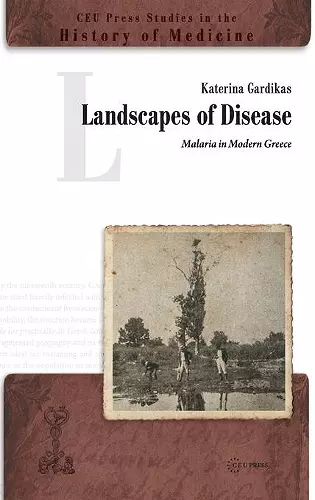Landscapes of Disease
Malaria in Modern Greece
Format:Hardback
Publisher:Central European University Press
Published:15th Nov '17
Currently unavailable, and unfortunately no date known when it will be back

Malaria has existed in Greece since prehistoric times. Its prevalence fluctuated depending on climatic, socioeconomic and political changes. The book focuses on the factors that contributed to the spreading of the disease in the years between independent statehood in 1830 and the elimination of malaria in the 1970s. By the nineteenth century, Greece was the most malarious country in Europe and the one most heavily infected with its lethal form, falciparum malaria. Owing to pressures on the environment from economic development, agrarian colonization and heightened mobility, the situation became so serious that malaria became a routine part of everyday life for practically all Greek families, further exacerbated by wars. The country's highly fragmented geography and its variable rainfall distribution created an environment that was ideal for sustaining and spreading of diseases, which, in turn, affected the tolerance of the population to malaria. In their struggle with physical suffering and death, the Greeks developed a culture of avid quinine consumption and were likewise eager to embrace the DDT spraying campaign of the immediate post WW II years, which, overall, had a positive demographic effect.
"The multidisciplinary and interdisciplinary approach adopted by Gardikas’s study is a strength. Expertly bridging the natural and social sciences and operating within a proper historical context, the central question of this study, as stated in the introduction, 'is how malaria interacted with the new social and economic realities that emerged in Greece after independence.' The quality of the microlevel analysis and the sensitivity to the complexity, diversity, and variability of local conditions (climatic, ecological, geographic, and socioeconomic) is one of the most impressive features of this book. Gardikas’s work effectively demonstrates the centrality of malaria in the story of modern Greece and provides further evidence of disease as a central feature of the human experience, both historically and today." * American Historical Review *
"Moving away from the usual focus on programmes of draining, repetitive oiling, Paris greening and, later on, DDT-based control, Gardikas's study attempts in a canvas of some 150 years to tell ‘a different story, that of the precarious lives of peasants, townspeople, and soldiers in their daily encounters with their physical environment’. In tune with Italian microhistory, or German Alltaggeschchite, it aims ‘to historicize a shared, banal experience of pain’. Malaria in Modern Greece will remain as a masterpiece on the dynamics of the disease within a century and half, and the cultural adaptations or failures to adapt of a given population to environmental pressures." * Medical History *
"This is a groundbreaking piece of research as it attempts to deal with the synchronic and diachronic dimensions of the disease—an enormous task to be undertaken by just one researcher—and its meticulous exploration opens up new avenues for future research." * Social History of Medicine *
"The breadth of this book is remarkable, as it effectively combines insights from natural and social science with detailed historical analyses. It presents a complex picture of epidemiological, social, and economic processes that clearly show the nonlinear character of progress against malaria. The high level of geographic detail, while useful for understanding these complexities, can be overwhelming for readers that are not fully acquainted with the country’s geography." * Technology and Culture *
ISBN: 9786155211980
Dimensions: unknown
Weight: unknown
220 pages